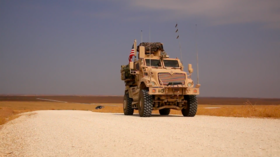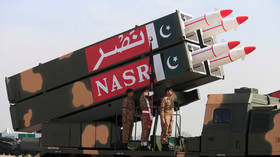As PM Hariri resigns and Lebanon faces a power vacuum, maybe it is time to reassess relations with the US
The exit of Lebanon PM Saad Hariri brings more unrest in a turbulent region, a loss of an ally to the US, as troops withdraw from Syria, there’s conflict with Iran and issues with Saudi Arabia. Trump needs a new pal in the region.
The resignation of a nation’s Prime Minister would have immediate consequences in many countries, but in Lebanon the announcement by Saad Hariri this week that he is stepping down is just the start of what is likely to prove a long, tumultuous journey on the road to economic and political recovery.
At a time when they need strong, stable leadership, the Lebanese people find themselves facing increasing tension on all fronts with a crumbling economy, US sanctions, a Syrian refugee problem, troublesome Hezbollah militia and the ever-likely prospect of war with Israel.
Also on rt.com Lebanese PM Hariri announces resignation amid large-scale protestsHariri’s exit from centre stage also leaves the USA minus one of its key allies at a time when the disappointment over the withdrawal of its troops from Syria, an ongoing dispute with Iran and a cooling of relations with Saudi Arabia mean it really could do with some close friends in the neighbourhood.
US Secretary of State Mike Pompeo tried to get the ball rolling on Tuesday, issuing a statement saying, “The United States calls on Lebanon’s political leaders to urgently facilitate the formation of a new government that can build a stable, prosperous, and secure Lebanon that is responsive to the needs of its citizens.”
Urgently facilitate? Now that might prove difficult as Lebanon has a penchant for taking its time in forming governments, spending, on average, several months in the process. It took more than two years to find its current president and nine months to create Hariri’s government.
Also on rt.com Iran’s Khamenei says US & allies behind public turmoil in Iraq, Lebanon after Hariri resignationThe urgency that Pompeo means centres around his nation’s need to address a power vacuum left by the departing leader. Because in President Trump’s continuing dispute with Iran, Lebanon is smack bang in the middle as home to Hezbollah who, thanks to their backing from the mullahs, take the Israel-Iran dispute right up to the Israeli border.
Hezbollah are very serious players. Created by the Iranian Revolutionary Guard after Israel invaded Lebanon in 1982, they hold three cabinet seats in government and have more power domestically than the Lebanese armed forces.
The US, in looking for ways to strong-arm Iran, has realised that the financial support given to Hezbollah that comes from the Lebanese banking reveals a vulnerability. Those same banks need to do global business to stay on their feet leaving them open to US sanctions which can prevent them from trading internationally, crippling the banks and cutting them off as source of funding for the militants.
The recent case of Lebanon’s Jammal Trust Bank is typical. The bank was sanctioned by the US for “knowingly facilitating banking activities” for Hezbollah militants – which it denied – and just weeks later was forced to go into self-liquidation. When this happens repeatedly it obviously hurts Lebanon’s banking system and steps need to be taken to avoid it. If that means doing what your US ally wants, then there is the route avoiding potential collapse of the entire financial network.
Then, on a slightly smaller scale, there are the US sanctions against two Hezbollah politicians and a security official in July of this year, sending yet another message to the Lebanese government that they really do need to get their house in order.
Also on rt.com Hezbollah warns of chaos in Lebanon, rejects protesters’ demands to bring down govtYou start to understand that because no one is suggesting that sanctions are used lightly, President Trump views having an on-message Prime Minister in power in Beirut as essential to the success of a broader strategy.
Hariri was that friendly face and he needed support in dealing with not only Hezbollah, but also his Syrian neighbours. In a country of just over 6 million people, Lebanon was hosting 1.5 million Syrian refugees and that was taking an economic and political toll at home.
He felt emboldened against Assad as long as he had American support, but as we have seen, that support came with lots of conditions. Then, when the US withdrew from Syria, Hariri saw that play disappear. The other big power in the region was Russia and he hadn’t been that nice about them in the past.
He told one interviewer that Russia’s appearance in the region as an active player was the “unfortunate consequence” of Barack Obama’s refusal to become embroiled in the Middle East disputes and those comments would certainly have been noted in Moscow for future reference.
While Lebanon goes about the lengthy process of sorting out its new government, probably with President Michael Aoun asking Hariri to stick around as caretaker until the matter is resolved, Lebanon needs to consider who, among the world powers would make the best of allies going forward.
Is it President Trump, with an election next year and the associated risks of that? He does have a hawkish stance on Iran which suits the Lebanese. Or is it Russia? Still active in Syria, but making close friends in the region – particularly Egypt – and Africa, where its ‘no strings attached’ efforts to broker business were a centrepiece of last week’s Russia-Africa forum in Sochi.
The people of the nation certainly deserve a break. Their 170km long, 170,000 person-strong human chain spanning from north to south of their country shows that, despite being an incredibly diverse society, with religions and ethnicity of all persuasions, the people of Lebanon are united in one belief: It is time for change.
Think your friends would be interested? Share this story!
The statements, views and opinions expressed in this column are solely those of the author and do not necessarily represent those of RT.
















